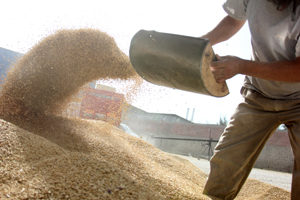Will the USDA Heed the Call for More Stringent Regulations?
[This article was previously published in the fall issue of The Cultivator, Cornucopia’s quarterly newsletter.]
by Anne Ross, JD
Farm and Food Policy Analyst at The Cornucopia Institute
 |
On July 18, Cornucopia submitted a formal request to the National Organic Program, petitioning the USDA to enact, on an expedited basis, critical regulatory changes to halt the entry of fraudulent organic grain into the U.S.
Cornucopia’s request calls for amending existing regulations to require new audit-trail protocols, mandating that importers trace grains back to overseas farms.
The petition also requests the USDA, in coordination with other governmental agencies, implement testing of all bulk imports of organic grain.
To ensure integrity throughout the supply chain, the USDA must immediately require certifiers to deploy inspectors to conduct unannounced pesticide residue testing on overseas farms located in known high risk countries.
While the petition awaits USDA review, the staggering losses to domestic organic grain producers continue to mount. Massive quantities of organic grain imports began to increasingly impact the market in 2015 and 2016.
The rise of organic grain imports over the last two years, even by conservative estimates, has resulted in losses exceeding $250 million for American organic grain farmers who can’t compete with the cheap prices of suspect imported grains.
In 2016, imports of organic corn were up over 80% from 2015. Organic soybean imports, already the majority of the market in the U.S., increased almost 20% over the same time period.
The U.S. is only growing a fraction of the organic grain needed by domestic markets. In fact, only about 60% of domestic organic corn and 10-30% of organic soybean demand is being met by U.S. farmers.
American production has been held down by the inability to compete with the imports on price. As questionable imports increase, consumers are left skeptical of organic authenticity amidst documented evidence of fraud.
The USDA has taken some incremental measures to address cases of documented fraud, but a wholesale review of the regulatory framework is necessary to prevent fraudulent imports from crossing U.S. borders.
On June 1, the USDA revoked the organic certification of Beyaz Agro, a Turkish grain handler identified in a Washington Post investigative report published in May, which exposed massive shipments of fraudulent organic grain.
According to The Post and NOP documents, Beyaz Agro exported conventional, fumigated soybeans from the Ukraine, represented as organic Russian soybeans.
The soybeans may have never entered the U.S. market had each entity in the supply chain been required to conduct the audit-trail protocols that Cornucopia has petitioned the USDA to implement.
While regulatory revisions are critical for change, citizens can exercise their voices politically and in the marketplace.
Organic stakeholders should call legislators and demand that importers, traders, and brokers who handle organic grains be certified under the USDA’s organic program.
Additionally, citizens should insist the USDA increase testing of shipments of organic grain presented for entry into the United States.
Much of the grain imported into the U.S. is used for livestock feed. If the animal feed is not organic, the beef, dairy, or eggs ultimately do not qualify for organic labeling.
Consumer pressure on livestock producers, processors, and retailers to buy domestic certified organic grains simultaneously increases demand for domestic product while decreasing demand for dubious imports.
Cornucopia is preparing scorecards for consumers and wholesale buyers that will highlight exemplary organic brands firmly committed to using domestic grain. Those brands that use imported organic grains will be red-flagged.
Increasing pressure for regulatory change, and demand for domestically grown organic grain through marketplace education, can only help farmers like Bob Joos, whose powerful story, depicting how he was unable to sell his crops after becoming certified organic, was featured in the last issue of the Cultivator.
Recently, Mr. Joos let us know that “much more is at stake than simply my ego, my family farm, or a profit or loss statement. Don’t forget the health risks and damages to the consumers who have been defrauded. It’s time for the USDA to step up and implement real change.”

